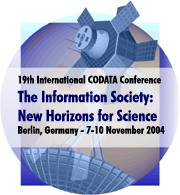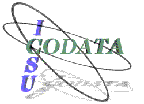
PROCEEDINGS
for the 19th International
CODATA Conference
THE INFORMATION SOCIETY:
NEW HORIZONS FOR SCIENCE
Berlin, Germany — 7-10 November 2004
CODATA 2004 Featured Sessions
CODATA
2004 Proceedings Index
Keynotes
Plenaries
Data Archiving
Data Quality
Data Visualization
E-Learning
Environmental
Informatics
Gas Hydrates
Infoscience
Today
Interoperability
Knowledge
Discovery
Multi-disciplinary
Data Projects
Open Scientific Communications
Publication and
Citation of Scientific Data
Scientific
Data for Economic Development
Scientific Informatics
in EurAsia
World Summit on the Information
Society (WSIS)
Posters
Submission/Publication Guidelines
Organization Committees
The
International Scientific Program Committee
The Scientific Advisory Committee
The Local Organization Committee
Scientific Program
Program at a Glance
Final Detailed
Program Book [large pdf file - you may want to right-click and save
to your computer]
General Information About the
Program
Keynote Speakers
CODATA 2004 keynote speakers are distinguished scientists who have used
scientific data as a core of their research. Professor Dr. Gasteiger is
widely recognized as a leading innovator in using databases for discovery
in chemistry and drug design. Professor Szalazy is well known for developing
the concept of "Data Exploration Science" and applying it to
astrophysics. Professor Sakaki is a world leader in using large scale
genomic and proteomic databases to identify the strategy of life acquired
through biological evolution.
Each of these Keynote talks provides unique insights in the growing importance of databases in scientific discovery.
Johann Gasteiger,
Germany
Data and design and discovery
Yoshiyuki Sakaki, Japan
Comparative
Genomics: A Bioinformatics-based Key Approach for Understanding our Genome
Data and Society
This session highlights the importance of scientific data in the advancement
of society.
Rene Deplanque,
Germany
The
use of scientific and technological data in today's society
Simone Rieger, Germany
Towards
a Web of Culture and Science
Roberta Balstad, USA
Social Data
and Society: Preventing Misuse of Social Data in the 21st Century
Data Archiving
This session examines the importance of long-term preservation of scientific
data and recent progress in creating sustainable data archives.
Clifford A. Lynch,
USA
Digital libraries
and data archiving
Gian Maria Pinna
Earth observation
data: Long-tem archiving and access
Data Visualisation
In a world where we are overwhelmed with volumes of data, data visualization
is critical to scientists to understand, use and exploit data in today's
research world. The session features three leaders in creating and exploiting
data visualization in science.
Milan Konecny, The
Czech Republic
Visualization of Geospatial
Data
Bodo Urban, Germany
Personalized Information
Visualization
Thomas Kirste, Germany
Ambient Intelligence:
The impact of the information revolution on our everyday life
Scientific Data Mark-up Languages
In a WWW environment that fosters the rapid and uncoordinated growth of
many scientific databases, mark-up languages are a key technology to enable
scientists to use multiple data resources in an easy and uniform manner.
Mark-up languages are crucial for database interoperability.
Brian Matthews, UK
The Semantic
Web and Science Data Exchange
Haruki Nakamura, Japan
XML
Description of Protein Structural Data for Data Grid and Computing Grid
Peter Murray-Rust,
UK
Chemical Mark-Up Language
Best Practices and Innovation in Scientific Data
Through-out the sessions of CODATA 2004, plenary speakers discuss major
advances in areas such as data quality, infoscience, knowledge discovery,
interoperability, data visualization, multi-disciplinary data use and
data policy. Each of these speakers brings significant knowledge about
the latest advances in scientific data work. CODATA 2004 in the only international
conference that allows you to find out what is happening in your discipline
and other disciplines at one meeting. Some of the featured plenary speakers
and their topics are listed below.
Ronald Munro, USA
Data Evaluation
as a Scientific Discipline
E. Dendy Sloan, USA
Gas Hydrates
- An Ideal Subject for CODATA Activity in the Information Age
Luigi Fusco, Italy
Earth
Science e-Collaboration Based on a Grid Infrastructure
Kate Beard, USA
Information
Integration through Events
Yan Bao Ping, China
Towards e-Science:
Scientific Database (SDB) and its applications in a new stage
Tomoko Nakanishi, Japan
Application
of Radiation and Radioisotopes in Agriculture Science
Robert S. Chen, USA
Global
Natural Disaster Risk and Vulnerability: Multidisciplinary Data Integration
in Support of
Global Disaster Management
Konrad Froitzheim, Germany
Presence
in Communication Spaces
Hideaki Sugawara, Japan
WFCC-MIRCEN
World Data Centre for Micro organisms (WDCM) meets Global Biodiversity
Information Facility (GBIF)
Long-term preservation
of accurate and authentic digital data: The InterPARES project
InterPARES (The International Research on Permanent Authentic Records
in Electronic Systems is a major effort on preserving the authenticity
of records in databases. Today it is focusing on the entire life-cycle
of records, a subject of great importance as science continues to build
large-scale comprehensive databases. Four international speakers discuss
different aspects of the InterPARES work.
Luciana Duranti, Italy
Long-term
preservation of accurate and authentic digital data: The InterPARES project
Paul Arthur Berkman,
USA
Antarctic Treaty
Searchable Database Case Study
William E. Underwood,
USA
Space
Science Data Archive Case Study
Fraser Taylor, Canada
The
Cybercartographic Atlas of Antarctica, and Related Archival Issues
Environmental Informatics
Sound environmental decisions can be made only by access to reliable research
results and facts from a wide variety of scientific disciplines. This
session describes a number of initiatives and technologies that aim to
improve the flow of information to those interested in sustainable growth
and other environmental policies.
Werner Pillmann, Austria
Informatics
Application for Sustainable Development - Environmental Communication
in Europe
Ralf Isenmann, Germany
Progress
in Sustainability Reporting - Reaping the Benefits of the Internet and
associated Technologies
Gerlinde Knetsch,
Winfried Schröder, Germany
Use of
Thomas Ruddy, Switzerland
The
Roles of Technology Assessment and Civil Society in the Development of
Controversial Technical Innovations
